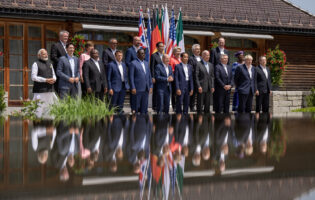Change in Political Communication
On February 17, 2009, the American-German Institute (AGI), in conjunction with the German American Business Council and with the generous support of the Elfriede Dräger Memorial Foundation, hosted an off-the-record discussion on “Change in Political Communication and the Implications for Democracy” in Washington, DC. The speakers examined the impact of new forms of political communication in the 2008 U.S. presidential election and discussed whether any lessons can be drawn for use in elections in Germany and elsewhere.
The speakers agreed that there is indeed a new media present in campaigns: the internet, or “Web 2.0,” which played a major role in the November 2008 U.S. presidential elections. The speakers found that the Obama campaign was able to start a political movement using the internet, which had never been done before. They debated, however, the importance of that role. They also debated whether this new media is replacing the old media forms (such as traditional newspapers, radio, and television), and whether the power that the new media offers to the individual is a wise or useful tool for political opinion-shaping. The panel concluded with a discussion in which the participants attempted to explain how these political movements start, and ways to sustain them once they have started.
Political communication in the recent U.S. presidential campaign deviated from previous campaigns with the introduction of new media, four aspects of which are considered relevant to politics: agenda-setting, problem-solving, organizing majorities for unpopular measures, and using new opportunities to present a politician’s best face. As a candidate, Barack Obama was able to reach out to new people by using new technologies, most notably the internet, focusing on social networking websites and communication forums that young people use, such as Facebook, email, and text messaging. This opened up new possibilities and utilized a new arena in which political debate could take place. By appealing to voters in a more personalized, interactive way, the Obama campaign created the potential for a more participative democracy. While using these new technologies may not completely replace the old forms of communication, they are certainly changing the rules of the political game.
Politics as we know it is being changed by the wave of new communication technologies; the question is now how to sustain and maximize this wave. The Obama campaign was forced to look for creative new ways to reach out to the voters. In the U.S, the center-right generally owns the old media and the churches, so the Democratic Party needed to find a new way to recruit support for its candidates. The social networks via the internet create an allusion of personal contact, which was used to create a feeling of a personal connection with then-candidate Obama, and to inspire a new generation of voters to become involved with the elections.
At the end of the discussion, a consensus emerged that the internet played a definitive role in the 2008 U.S. presidential elections, specifically as a new communication tool. The speakers also agreed that this trend needs to be sustained, but did not agree on how this could be accomplished. What is still unclear is whether this new internet forum will be useful in German politics, where the political system is focused on political parties and not on particular political personalities, and internet use has developed more slowly and cautiously, with fewer social networking sites and lower user rates. The origin of political communication via the internet is likewise unclear; determining how this alternative political movement started might help political analysts to transfer the internet’s use to German political campaigns and beyond. Only time will tell if this new arena is a fad or whether it will definitively change the face of politics.







